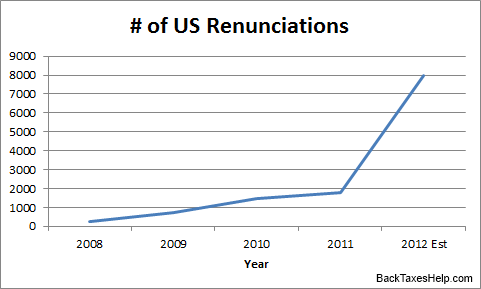One thing that is changing over the last few years is that more Americans are giving up their US citizenship. This trend coincides with not only relatively recent legislation that discourages expatriation and foreign bank accounts, but also proposed legislation that makes expatriation more expensive and tax compliance mandatory for an American’s right to passport.
How Many People Are Renouncing their US Citizenship Each Year?
The IRS has been required to report quarterly in the Federal Register individuals who officially give up their US citizenship since 1996, with the Department of State providing most of that information. This true numbers are hard to accurately measure because not all US citizens who leave formally renounce their US Citizenship, and many are critical of the way the data is reconciled. However, we can still see a trend below illustrating growth. In fact, the number of US citizens expatriating in 2012 is greater than the sum of those that did so from 2007-2009. The 2012 estimate is based off of what immigration officials expect according to a NY post article.

Are Taxes the Primary Reason for Expatriation?
Taxes seem to be the common reason why many renounce their US citizenship. After all, as wikipedia clearly states, the “United States is the only country in the world which taxes based on citizenship rather than residency, on worldwide income or estate of individuals, in the same manner as residents.”
By looking at the history of laws and regulations around expatriation, it seems the primary motive with these laws is to stop tax avoidance. But why were individuals trying to avoid taxes? After all, taxes are part of a civilized society. If we dig deeper, legislation often was enacted when tax rates were high or were likely to rise:
- 1966 – Foreign Investors Tax Act – This added sections 2501, 2107, and 877 to the Internal Revenue Code. Made expatriates subject to taxes on US sourced income for 10 years (IR Code Section 877) afterwards if the primary reason for expatriation was the avoidance of taxes. Tax avoidance as the motive still had to be proven by the IRS. Key Fact: During the 60s, the the top individual income tax rate was as high as 91%!
- 1996 – H.R. 3103 with the Health Insurance Portability and Accountability Act (HIPPA) requires the IRS to put up a “name and shame” list of individuals losing United States citizenship in the Federal Register. See here page 167. Individuals with a green card were impacted by the expatriation tax if they lived in the US 8 of the last 15 years. Moreover, a person had to provide a statement of net worth to the Department of State because the law presumed a person was leaving for tax avoidance if their average 5-year net income tax was more than $100k, or if an individual’s net worth was more than $500k (adjusted for inflation). The principal tax avoidance intention could still be legally challenged and negated. Key Fact: Remember this is only 3 years later after tax rates on the top two individual tax brackets were increased, the Medicare payroll tax cap was increased, corporate taxes were increased, and the portion of of income subject to Social Security Tax was increased.
- 2004 – American Jobs Creation Act – Amended IR Section 877 and added Section 7701(n). The motive of tax avoidance became irrelevant. If an individual’s average tax liability for the last five years was at least $124,000 (indexed annually) or had a net worth of at least $2 million (not indexed) then the individual was subject to the expatriation tax. The act also required the individual prove he or she is tax compliance for the last five years. Moreover, a notice to the Department of Secretary or Department of Homeland Security with an information statement is required, and he or she must file one for the next ten years after expatriation. It also stated that any individual who is the US more than 30 days for a period of 10 years preceding expatriation would have to pay taxes on worldwide income (with some exceptions).
- 2008 – Heroes Earnings Assistance and Relief Act (HEART Act) created IR Section 877A which replaced the 10 year alternative tax regime and imposed a mark to market (on those who expatriate after June 16th, 2008) exit tax on individuals if their 5 year income tax liability exceeded $139,000 or if they had a net worth of at least $2 million. The tax is computed as if the individual liquidated their assets and their net gain is greater than $600k. Therefore, current capital gains rates would come into play. For 2012, these numbers are $151,000, $2 million (net worth), and $651,000 respectively. Afterwards, the former American doesn’t have to pay capital gains on US sourced income, but is subjected to 30% withholding tax on US source dividends and interest payments. However, tax payments can be deferred until an asset is sold or exchanged provided their is adequate security (e.g. a bond or another type of security). However, you run the risk of being taxed at a higher rate if tax rates go up when you finally sell. Lastly, the HEART Act added section 2801 to the Internal Revenue Code which puts the highest gift or estate tax rate on the recipient of a direct or indirect gift or bequest from a “covered expatriate.”
- 2010 – Cost of US renunciation is now $450 dollars, previously it was free.
What Seems to Be Contributing to the Rise in Expatriation?
- FBAR and the Foreign Tax Compliance Act
Last year the IRS finalized FBAR regulations or the reporting of Foreign Bank and Financial Accounts. This requires US citizens with financial interest in a foreign financial account(s) that total $10,000 more in a given year to report it to the IRS. The IRS over the last few years has made a resilient effort to crack down on offshore back accounts, even providing amnesty to those who come forward. This among other things, has made it very difficult for Americans to do business with banks overseas.With the Foreign Account Tax Compliance Act, many banks do not want the extra compliance costs nor do they want the potential threat of stiff penalties hindering their performance or profits. Basically, they are saying, “No Thanks,” if a customer has a US citizenship.” What many Americans with dual citizenship are doing with our complex tax laws, especially if they are living and working overseas, is to renounce their citizenship.
- A Weak Economy – A weak economy here may have caused many to leave the country and give up their citizenship. With US citizens still having to pay taxes on foreign income potentially, this could be what pushes them over the edge.
- Other Potential Legislation – There is more legislation in the potential pipeline to penalize expatriates. Chuck Schumer’s Ex-Patriot Act would levy a 30% tax on any capital gains from US property for those people who lost citizenship or permanent residence from 2002 on and it would make it illegal to renter the United States under immigrant and non-immigrant categories. Just this year we also heard of Barbara Boxer’s bill she authored Senate Bill 1813 that would make it illegal to travel outside the United States if a notice of lien or levy has been filed on the individual by the IRS.
The Economic Impact
In reviewing the laws that discourage expatriation, it is the wealthy that are targeted. Therefore, one thing that is probable is that if corporate, capital gains, dividend, and individual income tax rates rise (which is likely), more of the wealthy will probably expatriate. Furthermore, as more laws are enacted to penalize expatriation, America is likely to suffer because the brain drain effect (attracting the best and brightest to work and come to to the US) will be lessened. As a result, America will see not only less jobs and productivity, but a lower standard of living.
Without a doubt, taxes are a common decision making factor for those Americans that give up their US citizenship. Legislators know this and have put forth US laws and regulations intended to prevent tax avoidance and expatriation. Paying all the taxes you owe as an expatriate or American is the right thing to do. The real question is, what would our founding fathers say? Maybe we shouldn’t we be asking not why we have laws discouraging US citizens from renouncing their citizenship but rather why do Americans want to leave? If we can figure that out, would we need legislation that serves to stop tax avoidance and discourage expatriation?



The US government must think hard about this situation if they don’t want to lose great assets that can affect the economy somehow. I know that the decreasing economy has a great impact on the working population because people always look for better opportunities which is most likely found abroad. Taxing them more will not solve the problem but instead cause them to renounce their citizenship.